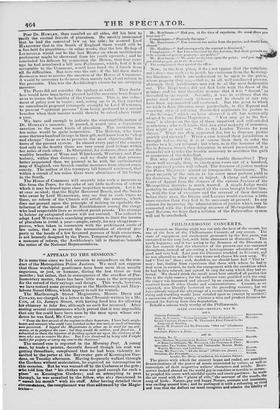" APPEALS TO THE SESSIONS."
IT is some time since we had occasion to animadvert on the con- duct of the Metropolitan Police Justices. We need not suppose that those worshipful gentlemen have been more than usually sagacious, or just, or humane, during the last three or four months ; but rather, that in consequence of the overflow of Par- liamentary matter, there has been little room in the newspapers for the record of their sayings and doings. This week, however, we have noticed some proceedings at the Marlborough and Mary- lebone Street Offices, which appear to call for remark. The Marlborough Street Magistrates, Messrs. DYER and Cosreser, are charged, in a letter to the Chronicle written by a Mr. Cox, .of 55, Jermyn Street, with having lined him for allowing his chimney to take fire, although no such fire occurred. After stating several circumstances which proved that it was impossible that any fire could have been seen by the man upon whose evi- dence he was fined, Mr. Cox sass- " From the first arrival of the engines to their departure, I have both neigh- bours and servants who could have testified no fire was seen, or smell of burning soot perceived. I begged the Magistrates to allow me to send for my wit- nesses, or to postpone the case ; but they would do neither, and fined me. I submitted to them the injustice of deciding against me upon the evidence of the man who was to receive the fine. But I was dismissed by being told I might indict for perjury or carry my case to the Sessions."
The second case is reported in the Morning Post. A young man, by trade a printer, decently dressed though his coat was getting threadbare, complained that he had been violently as- saulted by the porter at the Bayswater gate of Kensington Gar- dens, on Tuesday afternoon. Having frequently walked through the Gardens without molestation, he expected no interruption on this occasion. But he was warned off by the Cerberus at the gate; who told him that " his clothes were not good enough for such a place" as Kensington Gardens; and on attempting to pass through, he was assaulted by the fellow, who ales threatened to 4' smash his mouth" with his staff. After having detailed these circumstances, the complainant was thus addressed by the Magis- trates— Mr. Rawlinson—" thud you, at the time of expulsion, the same:dress you hare now?"
Complainant.—" Precisely the same." • Mi. Rawlinson—" Yuu received due notice from the porter, and should tits obeyed."
Mr. linskins—" And consequently the warrant is dismissed." Complainant—" Am I to understand by this decision, that these grounds are to be considered private property—nut public ?" Mr. Itawlinson—" We to die no drci..iun upon the point ; and you you think proper, go to thrSessions.,, 4 'the complainant then quitted the office.
Now, in the first place, it doss not appear that the complain- anes dress was such as to justify his exclusion from the Kensing- ton Gardens; which are understood to be open to the public, whose property they are,---that is, to all well-conducted persons, althouon their habiliments may not be of the most fashionable cut. The Magi,tratss dill not find fault with the dress of the printer: and we may therefore assume that it was " decent," as described in t he report. Serondly, it Was in evidence that rate porter used unnecessary violence ; and he should at any te have been reprimanded and cautioned. But the point to which we wish to draw attention more particularly, is the flippant and sneering style of referring dissatisfied applicants for justice to " the Se,;sions," which we have observed is all but universally adopted bv our Police Magistrates. " You may go to the Ses- sions' is always on the lips of these impatient and self-satisfied gentlemen ; who well know, that in a great majority of instances, they might as well say, " Go to the London Tavern for your (limier." What are they appointed for, but to dispense justice quickly and cheaply ? When a case beyond their jurisdiction is brought before them, it is of course their duty to refer the parties to a hi;.: her tribunal ; but when, as in the instance of the fire in Jerinyn Street, they determine to award punishment, it is shameful not to take the trouble necessary to ascertain the guilt or innocence of the defendant.
But why should the Magistrates trouble themselves ? They know well enough, that, in ninety-nine cases out of a hundred, the aegrievel parties will submit. The dearness of justice renders the Police Magistrate almost an irresponsible functionary. The great mejority of the suitors in his court must perforce yield to Iris decisions, be they ever so unjust. A cheap and accessible Court of Appeal from the decrees of the various Justices of the
Metropolitan districts is much wanted. A single Judge would probably be enabled to dispose of all the cases brought before him;
as, with the fear of exposure and the reversal of their decisions
before their eyes, the DYERS and LAINGS would exercise a little more caution than they feel to be necessary at present. In any
scheme for improving the administration of justice which may be connected with the forthcoming measure of Metropolitan Muni- cipal Reform, we hope that a revision of the Police-office system will not be overlooked.


























 Previous page
Previous page